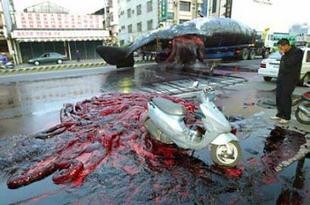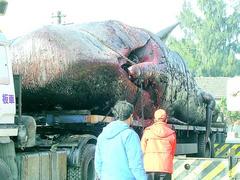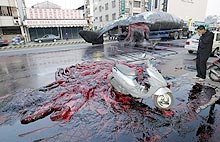Conrad is upset with John Kerry for saying that the threat of terrorism has been exaggerated by our leaders. But couldn’t it be possible that Kerry has a valid point?
Obviously terrorism is a horrendous danger. But how much money (and angst) should we be spending on it? And how many rights should we sacrifice to make the world safer from terrorism?
The Bush mentality seems to be “whatever it takes.” This siege mentality allows us to spend literally unimaginable amounts of money fighting our War on Terror. Don’t we have a right to question what the return on investment is? And considering the billions and billions being spent, is it that strange that some of us feel the threat, dire and awful as it is, has indeed been exaggerated, especially in regard to life’s many other threats?
This was driven home to me today after I read an absolutely superb article on whether 911’s costs in terms of freedoms sacrificed and money spent are matched by the actual threat at hand. This piece, which I found via an obscure blogger, is definitely a must-read. It manages to take a complex and ultra-loaded subject and get the reader to look at it from a new perspective.
Security is a trade-off. It makes no sense to ask whether a particular security system is effective or not–otherwise you’d all be wearing bulletproof vests and staying immured in your home. The proper question to ask is whether the trade-off is worth it. Is the level of security gained worth the costs, whether in money, in liberties, in privacy or in convenience?
This can be a personal decision, and one greatly influenced by the situation. For most of us, bulletproof vests are not worth the cost and inconvenience. For some of us, home burglar alarm systems are. And most of us lock our doors at night.
Terrorism is no different. We need to weigh each security countermeasure. Is the additional security against the risks worth the costs? Are there smarter things we can be spending our money on? How does the risk of terrorism compare with the risks in other aspects of our lives: automobile accidents, domestic violence, industrial pollution, and so on? Are there costs that are just too expensive for us to bear?
Rarely do we discuss how little identification has to do with security, and how broad surveillance of everyone doesn’t really prevent terrorism. Unfortunately, it’s rare to hear this level of informed debate. Few people remind us how minor the terrorist threat really is.
Rarely do we discuss how little identification has to do with security, and how broad surveillance of everyone doesn’t really prevent terrorism. And where’s the debate about what’s more important: the freedoms and liberties that have made America great or some temporary security?
Instead, the Department of Justice, fueled by a strong police mentality inside the administration, is directing our nation’s political changes in response to Sept. 11. And it’s making trade-offs from its own subjective perspective–trade-offs that benefit it even if they are to the detriment of others.
The writer is Bruce Schneir, an author and expert on security issues. I admire his ability to drive home points that we’re not hearing enough about. It’s quite staggering: there is no ceiling, no spending limit when it comes to protecting us against terrorism (fast becoming a nearly indefinable mess of a word). Are we truly getting a level of protection that matches the vast expense? Are the tradeoffs in terms of freedoms and tax dollars expended justified?
When you put the police in charge of security, the trade-offs they make result in measures that resemble a police state.
This is wrong. The trade-offs are larger than the FBI or the Justice Department. Just as a company would never put a single department in charge of its own budget, someone above the narrow perspective of the Justice Department needs to be balancing the country’s needs and making decisions about these security trade-offs.
The laws limiting police power were put in place to protect us from police abuse. Privacy protects us from threats by government, corporations and individuals. And the greatest strength of our nation comes from our freedoms, our openness, our liberties and our system of justice.
Ben Franklin once said: “Those who would give up essential liberty for temporary safety deserve neither liberty nor safety.” Since the events of Sept. 11 Americans have squandered an enormous amount of liberty, and we didn’t even get any temporary safety in return.
Yes, maybe the threat of terrorism has been exaggerated. It is not unpatriotic to suggest as much. We have to approach it as rational people, and not give Bush and Ashcroft carte blanche to spend however much on it they see fit, and to erode essential freedom in the name of the T word. Just as with trips to Mars and the moon, we should and must ask, is it worth it, or is the need an exaggerated one?



Comments